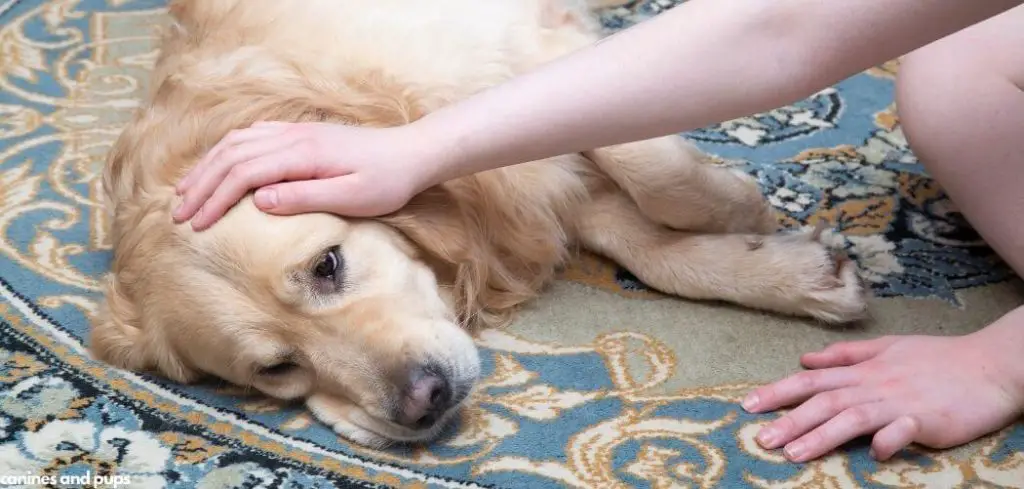Dogs sometimes develop sudden behaviors that worry their owners, and excessive licking combined with gulping is one of those red-flag signs.
It can indicate digestive discomfort or more serious health conditions. Because these symptoms may signal an underlying issue, it’s important not to ignore them.
We outline the common reasons why a dog may excessively lick and gulp, what you can do at home, and when to seek veterinary help.
Dog Excessive Licking and Gulping — Why It Happens
When a dog starts excessively licking and gulping, it’s usually their body’s way of responding to discomfort. The behavior can stem from nausea, acid reflux, dental disease, anxiety, or even something lodged in the throat. Sometimes, it’s a sign of gastrointestinal upset or conditions like pancreatitis.
Because both licking and gulping are tied to oral and digestive discomfort, owners should take the symptoms seriously and observe if other signs appear alongside them.

Dog Excessive Licking and Gulping: Common Causes
Acid Reflux or Gastroesophageal Reflux Disease (GERD)
Acid reflux occurs when stomach acid flows upward into the esophagus, creating irritation. Dogs may start licking excessively to soothe the burning sensation, and gulping follows as they swallow repeatedly to clear the discomfort.
Owners might also notice burping, swallowing hard, or even regurgitation. Chronic reflux can damage the esophagus and make eating painful, so veterinary evaluation is needed.
Read more: Dog Excessive Licking and Coughing (When it means)
Nausea and Gastrointestinal Upset
Nausea is one of the most common reasons dogs lick excessively. The licking is a self-soothing behavior, while gulping often reflects attempts to swallow saliva caused by nausea.
Causes of nausea can include dietary indiscretion, infections, toxins, or motion sickness. If vomiting or loss of appetite also occurs, it’s a clear sign that the digestive system is struggling.
Foreign Object Stuck in the Throat or Mouth
If a dog suddenly begins licking and gulping, it could mean something is stuck in the throat, such as a piece of bone, stick, or toy fragment. The repeated licking is a stress response, while gulping is an effort to dislodge the object.
Owners may notice gagging, coughing, or pawing at the mouth. This situation can quickly become an emergency if breathing is impaired.
Dental Disease or Oral Pain
Oral discomfort from gum disease, tooth abscesses, or mouth ulcers can lead to excessive licking. Dogs may also gulp repeatedly because swallowing feels uncomfortable.
Signs like bad breath, drooling, or visible tartar often accompany oral pain. Left untreated, dental disease can spread infection and cause systemic illness.
Anxiety or Stress-Related Behavior
Some dogs lick excessively when they’re anxious, and gulping can follow as a physical reaction to stress. Separation anxiety, loud noises, or new environments can trigger these behaviors.
Unlike medical causes, stress-related licking and gulping often occur during specific triggers. Still, ongoing stress can affect a dog’s overall health, so addressing the cause is important.
Pancreatitis or Other Serious Illness
Pancreatitis, a painful inflammation of the pancreas, can cause dogs to lick excessively and gulp due to nausea and abdominal pain. Other illnesses, like kidney or liver disease, can also trigger these signs.
Dogs with pancreatitis often appear lethargic, vomit, and show signs of abdominal discomfort. These conditions require immediate veterinary care.
What to Do If Your Dog Is Excessively Licking and Gulping
If a dog is showing these symptoms, the first step is to stay calm and carefully observe. Check for anything lodged in the mouth or throat that could explain the behavior. If it seems minor and the dog is otherwise normal, monitor for a short time to see if it passes.
For mild stomach upset, offering a bland diet such as boiled chicken and rice for 24–48 hours may help settle digestion. Keeping the dog hydrated is also key, especially if nausea or vomiting is present.
Reducing stress can also make a difference if anxiety is the trigger. Creating a calm environment, using enrichment activities, and offering comfort can help lessen the licking and gulping.
However, if the symptoms are persistent, worsen, or occur alongside vomiting, lethargy, or pain, veterinary care is the safest option.
When to Call or Visit Your Vet
Seek immediate veterinary attention if the dog is gagging, choking, or showing signs of breathing difficulty. These may indicate a foreign object in the throat.
Contact the vet promptly if the licking and gulping are accompanied by repeated vomiting, diarrhea, refusal to eat, or extreme lethargy. These are signs of a potentially serious illness.
Even if the symptoms seem mild but persist for more than a day or two, a veterinary exam is recommended. Dogs often hide discomfort, and excessive licking and gulping can point to a deeper issue.
Read more: Dog licking excessively (Discover what it might mean)
Key Takeaway
Excessive licking and gulping in dogs is more than just a quirky habit — it’s often a signal of nausea, discomfort, or a health problem that shouldn’t be ignored. While some causes are minor, others can be urgent, making it important to pay attention and act quickly.
At-home care may provide relief in mild cases, but persistent or severe symptoms should always be checked by a veterinarian. With prompt attention, many dogs recover well and return to their happy, healthy selves.
